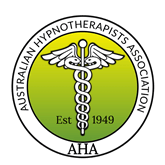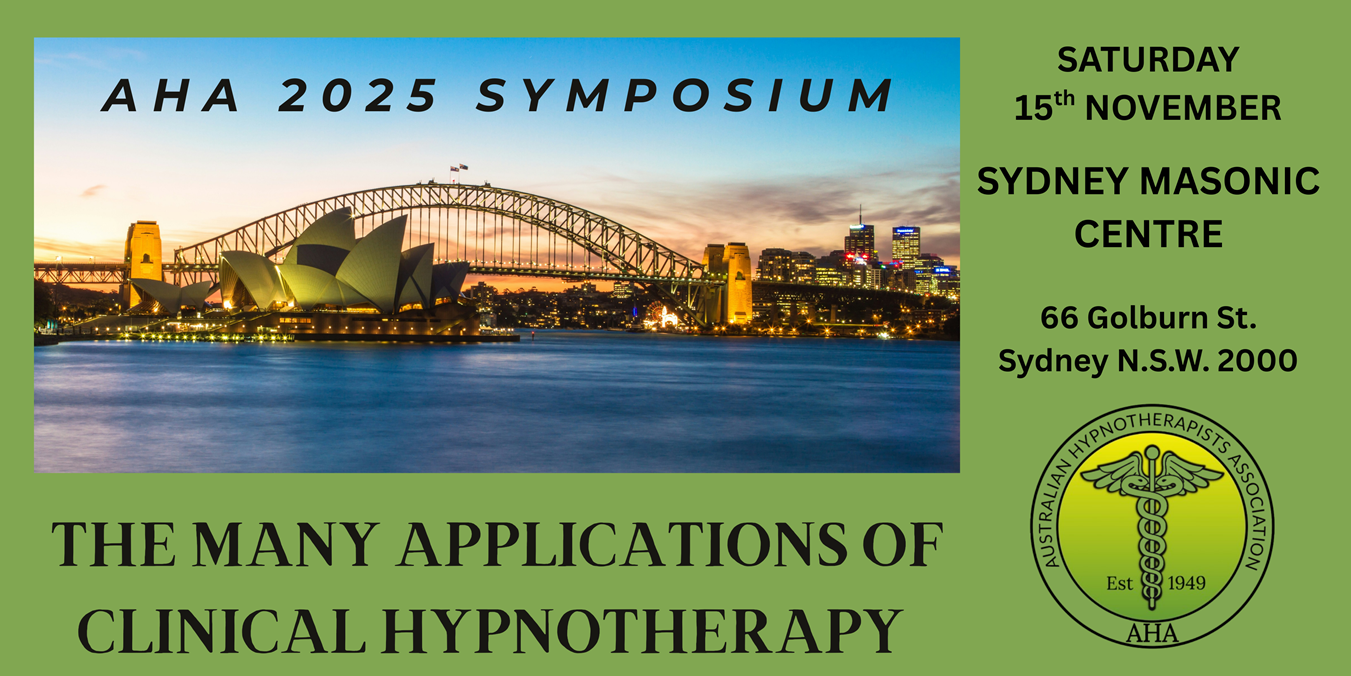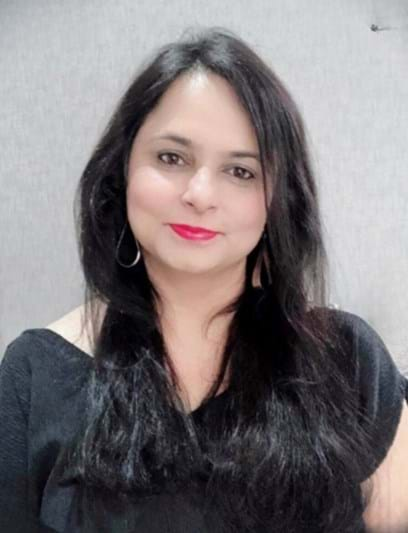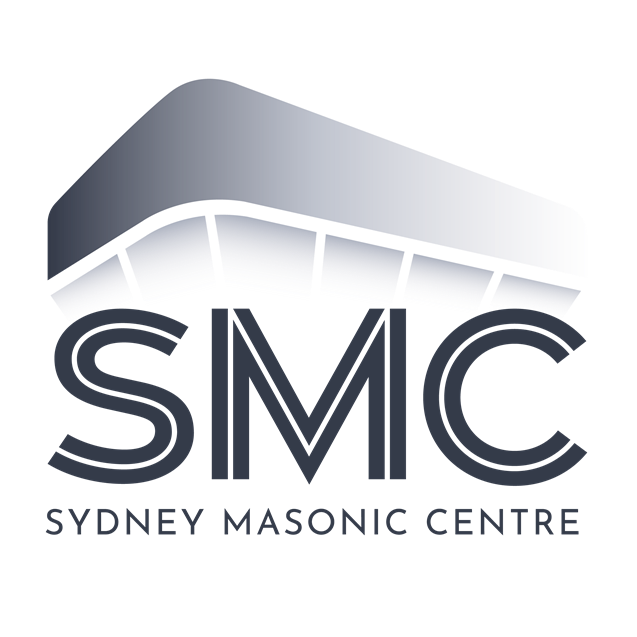2025 AHA Symposium - The Many Applications of Clinical Hypnotherapy
Date: Saturday 15 November 2025
Welcome!
Dear Colleagues,
Welcome to the 2025 AHA Annual Symposium
It is with great pleasure that I extend a warm invitation to you on behalf of the Australian Hypnotherapists’ Association to join us for the 2025 AHA Annual Symposium, taking place on Saturday, November 15th, at the Sydney Masonic Centre, a truly state-of-the-art venue in the heart of one of the world’s most iconic cities.
Our Symposium theme this year celebrates the diverse and evolving applications of Clinical Hypnotherapy, and I have no doubt that the program will both stretch and enrich your professional thinking. From emerging clinical research to practical therapeutic tools, our speakers will offer expertise, insight, inspiration, and robust discussion across the broad spectrum of hypnotherapeutic practice.
The Sydney Masonic Centre offers not just a beautiful and modern setting, but also a fitting space for reflection, learning, and reconnection. And Sydney itself; vibrant, energetic, and full of life, serves as the perfect backdrop for a weekend of renewal, both personally and professionally.
More than anything, I am excited about the opportunity for us to once again come together in person to share ideas, challenges, successes, and above all, our deep commitment to the healing work we do. The AHA Symposium has always been more than an event; it is a touchstone for our hypnotherapy community, and I very much look forward to seeing you there.
Registrations are now open, and I encourage you to secure your place early.
With warm regards,
Danielle Aitken
President
Australian Hypnotherapists’ Association
AHA Symposium Program
Saturday 15th November 2025
8:30 Arrival/Register
Sydney Masonic Centre
66 Goulburn Street,
Sydney
NSW 2000
8:45 Intro/welcome
Master of Ceremonies - Kylie Playford, Symposium Master of Ceremonies
Kylie Jane Playford is a distinguished Counsellor, Hypnotherapist, and Coach with over two decades of experience in mental health and personal development. As the founder of PsycFlex in Adelaide, she offers a client-centred, trauma-informed approach that integrates modalities such as Hypnotherapy, NLP, Time Line Therapy™, Art Therapy, and Equine Assisted Psychotherapy. Kylie supports clients across all ages and the neurodiversity spectrum, tailoring interventions to meet the individual needs of each client. Her expertise extends to executive coaching, relationship counselling, family mediation, and supporting clients through legal challenges, fertility journeys, and trauma recovery. A certified trainer in Hypnotherapy, NLP Coaching, and Time Line Therapy™, Kylie also serves on the board of the Australian Hypnotherapists Association, contributing to ethics and professional development initiatives. Her commitment to fostering emotional resilience and psychological excellence makes her a respected leader in the field. PsycFlex.com
8:50 am - Welcome Address, AHA President
Danielle, Aitken, President, AHA
A registered Nurse and Midwife, Danielle spent 20 years working in IVF. During this time, she studied genetics at Newcastle University, coordinated genetic infertility clients, managed international research trials, all whilst coordinating a busy patient load dealing with all aspects of the IVF journey.
Now a Counsellor and Clinical hypnotherapist, Danielle is inspired by human mind- body potential. She is a HeartMath Practitioner® and holds a credential in Clinical Neuroscience. She has been called as an expert witness for the professional practice of Hypnotherapy in Australia. She is a Clinical Supervisor and has also worked as a tutor and assessor of Clinical Hypnotherapy and Counselling at a Victorian RTO for many years. An Author and International Speaker on mind-body therapy and healing modalities, Danielle has been interviewed on Radio, TV, and Podcasts and has written three Amazon no.1 bestselling books and co-authored several others. She writes to educate and inspire her readers about human potential.
She now holds the position of President of the Australian Hypnotherapist’s Association whilst running her own busy private practice.
9:00 By Dr Tracie O’Keefe DCH, BHSc, ND - Hypnotherapy for Sex Addiction Psychodynamic approaches in treating compulsive sex disorder.
Trauma-informed techniques to support healing and reconnection
Sex addiction is a major problem for many people that is rarely understand by clinicians as it can been seen as moral degradation rather than psychological and physical problems. Urry et al (2023) identified large gaps in the training of mental health professionals around sexuality.
Milton Erickson (1980) worked with hypnosis and sexual problems, Millet (2005) with group hypnosis and sex addiction, and Gordon (2016) et al, reviewed their use of mindful awareness in sex addiction. But the field of using hypnosis with sex addiction is largely under researched. The majority of hypnotherapists and medical hypnotists do not have the training to help clients experiencing sexual addiction, even though habit cessation is one of our specialities.
Hypnotherapy is a valuable and useful tool for balancing a person’s sexual impulses within a healthy criteria of life needs. Therapists also need to understand physical, psychological and emotional drivers that cause people to engage in compulsive sexual activity.
During the presentation/workshop I will review four cases of sex addiction from my new book and invite workshop attendees to consider some of the drivers of those addictions. Learning to understand a bio/psycho/social model and interpersonal dynamics of sex addiction can help hypnotherapists formulate hypnotic treatments to aid cessation.
References
Approaches for improving sexuality and sexual health care in mental health settings: A qualitative study exploring clinicians' own perspectives
https://onlinelibrary.wiley.com/doi/10.1111/inm.13234
Kristi Urry, Georgia R. Breakey, Brett Scholz, Anna Chur-Hansen
Meditation Awareness Training for the Treatment of Sex Addiction: A Case Study
William Van Gordon 1,*, Edo Shonin 1, Mark D Griffiths 1
https://pmc.ncbi.nlm.nih.gov/articles/PMC5387789/
The Collected Papers of Milton H Erickson on Hypnosis Vol 1-4 Complete Set, Irvington Publishers Inc, USA, 1980.
Millet, E. (2005). The benefit of group hypnotherapy in the treatment of sex addictions. Journal of Heart Centered Therapies, 8(1), 1-6.
Dr Tracie O’Keefe DCH, BHSc, ND
Tracie is a clinical hypnotherapist, psychotherapist, counsellor, sex therapist, researcher and educator, member of the Australian Hypnotherapists Association, Psychotherapy and
Counselling Federation of Australia registered mental health professional, couples and family therapist, and clinical naturopath registered with the Australia Naturopathic Practitioners Association. (ANPA). She started in sexology at college in 1970 in co-counselling groups and has worked in the field for 55 years, presenting at many colleges and universities.
She has been a member of the Australian Society of Sex Educators and Researchers, Harry Benjamin Internation Gender Dysphoria Association (HBIGDA), World Professional Association of Transgender Heath (WPATH) and presented at the World Sexology Conference twice. She has published five previous books on sex, gender and sexuality and due to publish a book on sex and clinical hypnosis in mid-2025. Previously having run a clinic at the London Medical Centre in the UK, she has run the Australian Heath and Education Centre, in Sydney, for the last 24 years.
10:00 Sally Jean - Embodied Post-Trauma Growth
Embodied Post-Trauma Growth
Embodied Post-Trauma Growth discusses the integration of Neuroscience, Embodiment, and Holistic Well-Being practices to support individuals experiencing trauma and stress.
This presentation will delve into the intersection of Hypnotherapy, Somatic Integration, and Applied Neuroscience, offering evidence-based and practical approaches to fostering resilience and post-traumatic growth. My aim is to promote Holistic, Neuroscience and trauma-informed well-being care that honours the complexity of trauma and the resilience of the human spirit.
The motivation behind this topic stems from both my personal experience of and professional commitment to trauma and Neuroscience-informed care. My own journey through disembodiment has deeply informed my understanding of how trauma is stored in the body, and why somatic integration is essential to effective post trauma growth.
When we support the soma to brain connections, we can create the conditions for sustainable change and a renewed connection with the somatic self. In this presentation, I will highlight how the combination of Hypnotherapy, Somatic work and Neuroscience can enhance therapeutic outcomes and support individuals in reclaiming their sense of embodiment, agency and well-being.
Sally Jean
is a Holistic Neuro-Psychotherapist, Educator and Human Rights Advocate. She
is the founder of Glow Well-Being. Sally is dedicated to integrating Neuroscience, creativity,
spirituality and holistic well-being practices, in order to support people through their
experiences of distress. Sally combines her extensive lived experience, education and clinical work in the fields of education and health to empower people to understand their bodies and embrace holistic ways to thrive.
Sally also plays an active role in community mental health initiatives, ensuring lived experience is at the forefront of advocacy and systemic change. Sally is a director on the Board of the International Association of Applied Neuroscience. She is driven to create change both in the way people understand their own well-being and within the approaches to well-being in communities and systems. She is committed to advancing research-driven, accessible, and innovative whole body health care, offering a compassionate, holistic approach that empowers individuals on their well-being paths.
11:15 Juanita Smith: Breaking Free from Unwanted Habits and Addictions with Hypnotherapy
Why This Topic?
Addiction is often misunderstood—not just by clients, but sometimes even by hypnotherapists. With over eight years of clinical experience and a 97% success rate in smoking cessation, I’ve developed a powerful 5-Step System that goes beyond surface-level behaviour change to address the deeper subconscious drivers behind addiction.
What began with smoking quickly expanded to clients seeking help for alcohol, drugs, gambling, food, and other compulsive behaviours. The consistent success of this approach across various addiction types led to the creation of a repeatable system that can be integrated into any hypnotherapy practice.
This session will provide hypnotherapists with the tools to confidently work with addiction—whether you're just getting started or seeking to refine your current approach. I’ll also highlight the often-overlooked elements, such as the structure and delivery of the Pre-talk, that can make or break the success of a session.
Key Points Covered:
- How to distinguish between an unwanted habit and an emotional addiction
- The Pre-talk: managing expectations, asking the right questions, and using visual explanations to build trust and strengthen client commitment
- Preparing clients for success post-session: language, mindset, and follow-through
- Addressing both conscious and subconscious blocks that drive addictive behaviour
- Why skipping certain steps reduces success—and how to avoid common pitfalls
Significance & Framework:
This framework blends neuroscience, behavioural therapy, and client-centred hypnotherapy, developed and fine-tuned through thousands of client sessions. My 5-Step System is grounded in evidence-informed approaches including subconscious reprogramming, the psychology of habit formation, and the neuroscience of change. It works by targeting the underlying emotional and neurological patterns that keep habits in place—helping clients break the cycle and create lasting transformation.
Through mentoring others in this system, I’ve seen first-hand how even small adjustments—particularly around client preparation—can lead to significantly better results. This presentation is for any hypnotherapist who wants to make a deeper impact, boost client success, and expand their practice into the addiction space with confidence.
Whether you’re new to working with addiction or you’ve had mixed results in the past, this session will equip you with a practical, proven approach that empowers both you and your clients to create real, lasting change.
Juanita Smith is a specialist Clinical Hypnotherapist, author, and hypnotherapy trainer and mentor with two thriving clinics in Sydney. Initially known for her work in smoking cessation—with a success rate over 97%—Juanita’s reputation quickly grew, attracting clients seeking help for alcohol, drugs, gambling, and other addictions.
Raised in a household where addiction was normalised, Juanita witnessed the deep emotional and physical toll it takes on individuals and families. These early experiences fuelled her passion to help others reclaim their freedom. With thousands of clinical hours behind her, she developed her signature 5-Step System—an approach that consistently delivers real, lasting change.
Juanita is passionate about helping clients take back control of their lives. She is the author of Is It a Habit or an Addiction? and mentors hypnotherapists across Australia, sharing practical tools and strategies to create transformational results in their clients’ lives.
12:15 Amanda Dounis: Delivering creative hypnotic ideas and counselling strategies for kids and teens
Working with kids and teens presents unique challenges, from short attention spans to resistance in therapy. However, when we integrate creativity into hypnosis and counselling, we tap into their natural problem-solving abilities, emotional processing skills, and imagination. I want to share how we can use storytelling, metaphors, play-based techniques, and sensory engagement to create lasting change.
Through this presentation, I aim to demonstrate that hypnosis for younger clients can be fun, dynamic, and highly effective when tailored to their world. I will showcase practical tools, case studies, and methods that have helped children overcome anxiety, behavioural struggles, and emotional regulation challenges.
Participants will leave with actionable strategies to enhance their own practice.
My Key points include:
- Engaging the Imagination: How to use stories, metaphors, and creative
visualisations to help kids and teens connect with hypnotic suggestions.
- Interactive Hypnosis Techniques: Incorporating movement, art, play, and
technology (e.g., virtual reality, sand tray, or tasking) to make hypnosis more
engaging.
- Emotional Regulation Strategies: Practical ways to help kids manage anxiety, frustration, and self-esteem issues using hypnosis and counselling tools.
- Overcoming Resistance: How to create a sense of autonomy and buy-in, ensuring kids feel empowered rather than forced into therapy.
- Success Examples: Examples of successful interventions with kids and teens, demonstrating different techniques and their outcomes.
By making hypnosis creative and engaging, we can achieve significant therapeutic breakthroughs while keeping sessions enjoyable and effective.
Amanda Dounis
is the Founder of four early learning centres in Sydney, Director of the Dounis Group, and Founder of The Positive Thinking Clinic, specialising in counselling, psychotherapy, hypnotherapy, and NLP. She supports individuals across all life stages—children, students, and adults—helping them embrace change, set goals, and develop resilience.
Amanda has created a self-development course for kids and teens, equipping them with essential life skills, and is the author of My Coping Skills Handbook, a valuable resource for kids aged 8-14, providing practical strategies for various daily challenges. With three Bachelor’s degrees and multiple diplomas, she views learning as a lifelong passion. Her work has earned nominations for excellence in business and education. Amanda believes growth comes from navigating life’s challenges and welcomes change as a catalyst for success, continuously updating her methods with the latest research and insights.
2:15 Sadhna Makhija: Unlocking the Potential - How Hypnosis Amplifies Psychotherapy's Impact.
This presentation explores how hypnosis can significantly enhance the effectiveness of psychotherapy by accelerating therapeutic change and deepening emotional processing. Drawing from both neuroscience and clinical practice, the session will outline why hypnotherapy often produces more rapid and lasting results than traditional talk therapy alone.
As a clinical therapist with extensive experience in integrative modalities—including Clinical Hypnotherapy, DBT, and Gestalt—I have observed the unique capacity of hypnosis to access the subconscious, disrupt maladaptive patterns, and facilitate profound shifts in belief systems. This presentation aims to provide both conceptual clarity and practical tools for clinicians seeking to harness this powerful modality.
Key areas of focus include:
- The neurophysiological mechanisms of the hypnotic state, particularly enhanced suggestibility and focused attention.
- How hypnosis enables access to the subconscious, promoting reprocessing of core beliefs and emotional memory.
- The therapeutic value of dissociation in safely working with trauma and emotionally charged content.
- The role of hypnosis in stimulating neuroplasticity and restructuring entrenched neural pathways.
Attendees will gain insight into the intersection of hypnosis and brain science, illustrated through current research and case-based examples. This session is designed for hypnotherapists, counsellors, and mental health practitioners aiming to deepen their understanding of hypnosis as a tool for catalyzing change in clinical settings.
Sadhna Makhija
is an integrative therapist, clinical hypnotherapist, and registered member of the Australian Counselling Association and PACFA’s College of Supervisors. With over seven years of experience, she blends evidence-based modalities—including DBT, Gestalt, CBT, and Narrative Therapy—with Clinical Hypnotherapy to support deep and lasting transformation.
Sadhna works with adults, teens, and children, helping clients navigate challenges such as anxiety, trauma, depression, phobias, and behavioral issues. Her approach is grounded in both compassion and neuroscience, with a focus on unlocking subconscious patterns to restore emotional balance.
Outside of her practice, Sadhna is a proud mother of two boys—one studying medicine and the other pursuing psychology. She has a keen interest in research, particularly in measuring the outcomes of integrative therapies and advancing the clinical use of hypnotherapy for trauma and phobias. Her work is driven by a commitment to holistic, meaningful, and measurable healing.
3:30 Gamze Cassandra Evren: HypnoLaugh: A Transformative Approach to Reconnection
The past five years have profoundly reshaped the way we connect—with ourselves and others. From forced isolation to the increasing reliance on digital tools, social media, and AI, we have gradually drifted away from our core essence. AI now refines our image, words, and interactions, leading many to feel like avatars—detached not only from the external world but from their own authentic selves.
As hypnotherapists, we understand that disconnection from self has both psychological and physiological consequences. Research shows that chronic stress and emotional suppression contribute to increased cortisol levels, emotional dysregulation, and mental fragmentation (Siegel, 2012). HypnoLaugh offers a holistic approach to counteract this.
HypnoLaugh is a modality I developed, tested, and refined over the years, integrating self-induced, aware laughter with self-hypnosis, coaching, and psychotherapy. It is designed to activate the parasympathetic nervous system (Porges, 2011), regulate emotions (Fredrickson & Levenson, 1998), and facilitate cognitive reframing (Ellis, 1962). Laughter therapy research supports that:
- Group laughter enhances pain tolerance by 10% (University of Oxford, 2011).
- It increases oxygen intake by 30%, boosting energy and cognitive function (University of Maryland Medical Center, 2005).
- It improves memory recall by 40% (Loma Linda University, 2014).
- It lowers blood pressure by 10-20% (American Heart Association, 2005).
- Laughter therapy has been shown to decrease burnout by 50% (Harvard Business Review, 2021).
- It reduces cortisol levels by 70%, significantly lowering stress and anxiety (American Physiological Society, 2008).
This approach enables individuals to experience somatic release, challenge masks, conditioning, beliefs and habits that no longer serve them. Within a deep self-hypnosis space, participants are invited to see, hear, and hold themselves with compassion, reconnecting with their authentic essence and realigning mind and body.
In a safe and supportive group setting, HypnoLaugh paves the way to a heightened self-awareness, emotional balance, and deep self-acceptance.
The results? A profound reconnection with self, ranging from increased mental clarity and emotional resilience to deeper self-compassion and inner peace. HypnoLaugh opens the door to greater self-understanding, turning laughter into a powerful vehicle for healing and transformation.
I invite you to experience this innovative modality firsthand. Join me in exploring a new dimension of therapeutic work, one that merges laughter with profound inner healing.
Gamze Cassandra Evren
is a Clinical Hypnotherapist, self-leadership coach, and the creator of HypnoLaugh - a transformative therapeutic modality that blends the power of laughter with the therapeutic effects of hypnotherapy to reduce stress, release emotional blockages, and enhance relaxation in a fun way.
With over two decades of experience, Gamze has helped individuals worldwide break free from anxiety, negative thought patterns, emotional issues and more, through integration of Systemic Family Constellations, Neuro-Trance Psychotherapy, and transformational coaching together with Clinical Hypnotherapy.
Gamze’s unique HypnoLaugh modality is a gateway to reconnection—a pathway back to yourself. Through the transformative power of aware laughter, it gently dissolves layers of tension, conditioning, and emotional barriers, opening the door to deep self-acceptance, release, and profound healing. This innovative approach creates space for transformation, allowing individuals to reconnect with their authentic essence in an empowering way.
Delegate Fees
Symposium: Saturday 15th November 2025
|
|
|||
|
Full Price Ticket AHA member |
$325.00 |
||
|
Full Price Ticket Non-member |
$350.00 |
||
|
|
|
|
|
| Book here |
All prices are in Australian dollars and include GST. Catering included in your Symposium ticket: Morning and afternoon tea/coffee, lunch.
If you are a member of an AHA Affiliate organisation please contact symposium@ahahypnotherapy.org.au for your discount code.
Two course meal at The Doric room at 6pm
Sydney Masonic Centre
66 Goulburn Street Sydney NSW 2000
$69 (inc GST)
Guests will be invited to make their selections from the menu closer to the date.

















